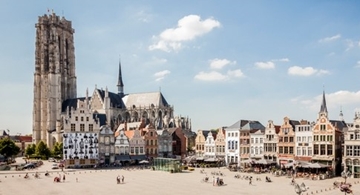District heating
Tomorrow’s heat networks will no longer be just about individual buildings. In urban areas and around available heat sources, increasing efforts are being made to find smart connections and coordination between suppliers and customers. Ingenium has been building expertise on (large-scale) heat networks for many years, at site, district, municipality and city levels.
In a heat network, a sustainable heat source fulfils a heat demand, which can be across a wide area. We look to match a heat supply (e.g. residual heat from industrial processes or waste incineration, co-generation or heat pumps) with d a heat demand on a local, city or regional scale. In doing so, we factor in the available, necessary and desired temperature levels, and we examine the technical-financial feasibility. Analyses vary from a quick scan, to a strategic vision or master plan study, to a full-scale cost-benefit analysis. After this a business model with a division of roles is prepared, which seeks an optimal balance in the benefits for the heat producer, the investor and the end user. Route studies then determine the most economical way to link heat demand and supply according to a logical phasing. Our expertise with above and below ground infrastructure comes in handy here. The heat network is then designed in detail and dimensioned, and finally we supervise the installation. We also provide advice on regulations throughout the entire process, including the very specific EPB standards as an important factor.
In source energy systems, the worlds of heat and electricity come together. A number of heat pumps and cooling machines are connected to a very low temperature network. The advantage is that very low temperature energy taken from the environment can also be used, like heat from the soil, residual heat from data centres, rivers and even waste water. The heat network then becomes a 'source network' that bundles various heat sources.
In making a success of large-scale energy systems, non-technical aspects like as bringing together the necessary stakeholders in a local heat coalition and convincing potential heat users play a particularly important role. We are therefore very happy to share our expertise in this area.
By collaborating with our partners in the international First Q Network, we keep our finger on the pulse of the rapid evolutions in district heating and smart grids engineering in Europe, in terms of both technology and the increasingly complex regulatory environment.
Related projects
 "De Nieuwe Dokken"
"De Nieuwe Dokken" is a real estate development by Schipperskaai Development (a consortium consisting of CAAAP, formerly Vanhaerents Development, and Van Roey Vastgoed) in collabor ...
View page
"De Nieuwe Dokken"
"De Nieuwe Dokken" is a real estate development by Schipperskaai Development (a consortium consisting of CAAAP, formerly Vanhaerents Development, and Van Roey Vastgoed) in collabor ...
View page
 HEAT STRATEGY MECHELEN
Ingenium and Levuur are jointly drawing up a vision and strategy for heat transition for the entire territory of the city of Mechelen.
View page
HEAT STRATEGY MECHELEN
Ingenium and Levuur are jointly drawing up a vision and strategy for heat transition for the entire territory of the city of Mechelen.
View page
